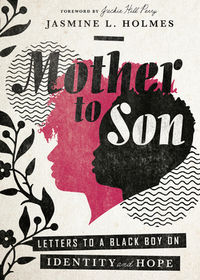Take a photo of a barcode or cover
I loved Jasmine Holmes' beautiful book of letters to her son. Though I am not black myself, I found these letters deeply moving. I mourned (again) for the experience of people of color in this country, and in the Church. I hope these letters will be read by many as a way to encourage a different path forward. I have a young son myself, and I could resonate with Jasmine's love for her son and her desires for his relationship with God as well as his growth and his future. I highly recommend this book for anyone, regardless of your skin tone. It will encourage you to think and is a great book to discuss with those in your personal community.
Thanks to the publisher and Netgalley for the ARC. I was not required to post a positive review. All opinions are my own.
Thanks to the publisher and Netgalley for the ARC. I was not required to post a positive review. All opinions are my own.
I had high expectations for this book.
It’s Christianity and suburban undertones was very unsettling for me. I really wanted to like this book the cover and the title reeled me in. It did not feel genuine it felt forced and unauthentic.
I enjoyed a few nuggets of truth but much was lost in the delivery.
It’s Christianity and suburban undertones was very unsettling for me. I really wanted to like this book the cover and the title reeled me in. It did not feel genuine it felt forced and unauthentic.
I enjoyed a few nuggets of truth but much was lost in the delivery.
This book was so wonderful. I loved being able to read it before bed and take a deep breath and join Jasmine as a mom on this motherhood journey. Even though ours will be different the hopes and dreams are resonant.
This review is also published on Medium: https://medium.com/interfaith-now/mother-to-son-letters-to-a-black-boy-on-identity-and-hope-by-jasmine-holmes-53fc1b18d2a6
Jasmine Holmes has written a powerful collection of letters to her black son on how the world will see him and gives advice on how he should behave in this world. However, the book of letters is also written for the white evangelical church who tends to ignore the issues of race and justice. Holmes’ book echoes other notable epistles like Baldwin’s [b:The Fire Next Time|464260|The Fire Next Time|James Baldwin|https://i.gr-assets.com/images/S/compressed.photo.goodreads.com/books/1562890148l/464260._SY75_.jpg|1129041] and Coates’ [b:Between the World and Me|25489625|Between the World and Me|Ta-Nehisi Coates|https://i.gr-assets.com/images/S/compressed.photo.goodreads.com/books/1451435027l/25489625._SY75_.jpg|44848425]. It also has elements that reminded me of Austin Channing Brown’s [b:I'm Still Here: Black Dignity in a World Made for Whiteness|35883430|I'm Still Here Black Dignity in a World Made for Whiteness|Austin Channing Brown|https://i.gr-assets.com/images/S/compressed.photo.goodreads.com/books/1510037868l/35883430._SY75_.jpg|57400480]. Unlike Coates but like Baldwin and Brown, Holmes’ book comes from a Christian perspective, one which is needed now more than ever.
This book is written primarily to her son. She encourages and warns him of various things. For example, she writes to her son that God made him black on purpose and that it is a good thing. She also warns him of the racial insensitivities that are sure to come his way as he gets older. One example Holmes uses occurred in the past when various white people remarked on her son’s cuteness by asking “how much do you want for him?”. The author and her husband unfortunately had to educate these people about how that question sounds to a black family who lives with the history of slavery everyday.
Holmes is very powerful when she criticizes the white church on its antipathy to talk about racial issues. One powerful moment in the book was when she wrote about how white evangelicals tend to mention that slavery was a blind spot in American history. She argues that blind spots do not lead to the dehumanization of a people who are made in God’s image. Slavery she argues is not a blind spot it's a sin.
In another episode she mentions the buzz phrase that white evangelicals use when racial issues are discussed, “just preach the gospel”. In her experiences in mostly white evangelical spaces, “just preach the gospel” means “just shut up”. They wanted her to just talk about the salvation that Jesus brings to all and let the racial issues take care of themself. But as Holmes effectively argues, talking about Jesus’ salvation is good and important but racial issues are never solved by ignoring them, they must be addressed and faced head on.
Near the end of the book Holmes gives advice to her son about the importance of speaking out about the issues he cares about. She highlights the challenge that she faces when she speaks before groups and how she is viewed by people on the political left and political right. Both groups try to pigeon hole and label her as being the opposite of their own views. I’ll be honest, there were times in this book that I did the same thing from my own political perspective. However, her advice to her son is to not worry about this and encourages him to speak out with conviction.
Lastly, Holmes focuses on the importance of representation not just in the media but also in theology. Holmes introduces three pastors, only one of whom I was familiar with before reading this book (Lemuel Haynes, Charles Octavius Boothe, and Francis Grimke). After mentioning them she writes a powerful line that I believe was written not just to her son and the white evangelical church but to black Christians like myself. She says that the truth of God is not limited to only white voices. It was a powerful quote to me and it has now challenged me to go out and read the works of these black theologians that I’m not familiar with.
As I read this book, I imagined what my own black mother would have written to me. My mother’s experiences were unlike Holmes in that they grew up during different times (I’m in Holmes’ generation) and experienced different albeit similar experiences. But the essence of Holmes’ message would be the same as my mother. The racist society that you live in will view you one way because you are a black male, it's your job to challenge and show them how they are wrong, using your Christian faith as your anchor.
Holmes’s book is a must read for black Christian sons, black Christian mothers, and the white evangelical church. It will definitely bring about fruitful discussions amongst its readers.
Thanks to NetGalley, InterVarsity Press, and Jasmine L. Holmes for the free ARC copy in exchange for a honest review.
Jasmine Holmes has written a powerful collection of letters to her black son on how the world will see him and gives advice on how he should behave in this world. However, the book of letters is also written for the white evangelical church who tends to ignore the issues of race and justice. Holmes’ book echoes other notable epistles like Baldwin’s [b:The Fire Next Time|464260|The Fire Next Time|James Baldwin|https://i.gr-assets.com/images/S/compressed.photo.goodreads.com/books/1562890148l/464260._SY75_.jpg|1129041] and Coates’ [b:Between the World and Me|25489625|Between the World and Me|Ta-Nehisi Coates|https://i.gr-assets.com/images/S/compressed.photo.goodreads.com/books/1451435027l/25489625._SY75_.jpg|44848425]. It also has elements that reminded me of Austin Channing Brown’s [b:I'm Still Here: Black Dignity in a World Made for Whiteness|35883430|I'm Still Here Black Dignity in a World Made for Whiteness|Austin Channing Brown|https://i.gr-assets.com/images/S/compressed.photo.goodreads.com/books/1510037868l/35883430._SY75_.jpg|57400480]. Unlike Coates but like Baldwin and Brown, Holmes’ book comes from a Christian perspective, one which is needed now more than ever.
This book is written primarily to her son. She encourages and warns him of various things. For example, she writes to her son that God made him black on purpose and that it is a good thing. She also warns him of the racial insensitivities that are sure to come his way as he gets older. One example Holmes uses occurred in the past when various white people remarked on her son’s cuteness by asking “how much do you want for him?”. The author and her husband unfortunately had to educate these people about how that question sounds to a black family who lives with the history of slavery everyday.
Holmes is very powerful when she criticizes the white church on its antipathy to talk about racial issues. One powerful moment in the book was when she wrote about how white evangelicals tend to mention that slavery was a blind spot in American history. She argues that blind spots do not lead to the dehumanization of a people who are made in God’s image. Slavery she argues is not a blind spot it's a sin.
In another episode she mentions the buzz phrase that white evangelicals use when racial issues are discussed, “just preach the gospel”. In her experiences in mostly white evangelical spaces, “just preach the gospel” means “just shut up”. They wanted her to just talk about the salvation that Jesus brings to all and let the racial issues take care of themself. But as Holmes effectively argues, talking about Jesus’ salvation is good and important but racial issues are never solved by ignoring them, they must be addressed and faced head on.
Near the end of the book Holmes gives advice to her son about the importance of speaking out about the issues he cares about. She highlights the challenge that she faces when she speaks before groups and how she is viewed by people on the political left and political right. Both groups try to pigeon hole and label her as being the opposite of their own views. I’ll be honest, there were times in this book that I did the same thing from my own political perspective. However, her advice to her son is to not worry about this and encourages him to speak out with conviction.
Lastly, Holmes focuses on the importance of representation not just in the media but also in theology. Holmes introduces three pastors, only one of whom I was familiar with before reading this book (Lemuel Haynes, Charles Octavius Boothe, and Francis Grimke). After mentioning them she writes a powerful line that I believe was written not just to her son and the white evangelical church but to black Christians like myself. She says that the truth of God is not limited to only white voices. It was a powerful quote to me and it has now challenged me to go out and read the works of these black theologians that I’m not familiar with.
As I read this book, I imagined what my own black mother would have written to me. My mother’s experiences were unlike Holmes in that they grew up during different times (I’m in Holmes’ generation) and experienced different albeit similar experiences. But the essence of Holmes’ message would be the same as my mother. The racist society that you live in will view you one way because you are a black male, it's your job to challenge and show them how they are wrong, using your Christian faith as your anchor.
Holmes’s book is a must read for black Christian sons, black Christian mothers, and the white evangelical church. It will definitely bring about fruitful discussions amongst its readers.
Thanks to NetGalley, InterVarsity Press, and Jasmine L. Holmes for the free ARC copy in exchange for a honest review.
This book is smart, vulnerable, compassionate, challenging, and exhortative. And inimitably gospel-centered. The epistolary style is engaging, in part because it gives readers a privileged glimpse into the tender words Holmes has for her son. Her hopes are rooted in Christ, and her expectations are tempered by a realistic view of the world. This book is not just for moms or for moms of black sons, but for all who want to walk with wisdom and grace in this world.
challenging
emotional
funny
hopeful
informative
inspiring
reflective
slow-paced
Check out the full review on my website. CLICK HERE
FOLLOW ME ON : TWITTER INSTAGRAM
REVIEW :
DISCLAIMER : Thank you, Netgalley and InterVarsity Press for providing me with an ARC of this book. I am reviewing this book voluntarily.
Jasmine's book Mother to Son is a great book for Christians written with so much heart and love in every word of the letters she has written for her two sons. The book as I mentioned consists of letters to her young black sons and is filled with wise, thought-provoking messages and advice on how to lead their life moving forward in today's world. The topics are heavy, sensitive and of utmost importance in navigating the world. Issues of race, justice, and identity are discussed at lengths with love, hope, and grace. All advice on navigating these heavy topics are delivered through the lens of religious texts. The scripture plays a huge part in every piece of advice she imparts her sons, always going back to God for guidance. The book was raw, honest, and beautiful. I found the letters to be powerful, thoughtful, and highly beneficial in understanding differences and also embracing them. I liked the book and found it to be compelling and persuasive. Having said that I don't think I am the target audience for it as it and I feel Christians should definitely pick it up. My rating is not for the quality of the content, as it is a 4⭐ book in that regard, but if I took the personal enjoyment into consideration, I would say it was a 3 ⭐ read for me. I believe this book should definitely be read by young black mothers, mothers and Christians to understand her perspective and also learn more about empathy, compassion, and hope in times of difficulty. I recommend checking this book out.
FOLLOW ME ON : TWITTER INSTAGRAM
REVIEW :
DISCLAIMER : Thank you, Netgalley and InterVarsity Press for providing me with an ARC of this book. I am reviewing this book voluntarily.
Jasmine's book Mother to Son is a great book for Christians written with so much heart and love in every word of the letters she has written for her two sons. The book as I mentioned consists of letters to her young black sons and is filled with wise, thought-provoking messages and advice on how to lead their life moving forward in today's world. The topics are heavy, sensitive and of utmost importance in navigating the world. Issues of race, justice, and identity are discussed at lengths with love, hope, and grace. All advice on navigating these heavy topics are delivered through the lens of religious texts. The scripture plays a huge part in every piece of advice she imparts her sons, always going back to God for guidance. The book was raw, honest, and beautiful. I found the letters to be powerful, thoughtful, and highly beneficial in understanding differences and also embracing them. I liked the book and found it to be compelling and persuasive. Having said that I don't think I am the target audience for it as it and I feel Christians should definitely pick it up. My rating is not for the quality of the content, as it is a 4⭐ book in that regard, but if I took the personal enjoyment into consideration, I would say it was a 3 ⭐ read for me. I believe this book should definitely be read by young black mothers, mothers and Christians to understand her perspective and also learn more about empathy, compassion, and hope in times of difficulty. I recommend checking this book out.
This book packs SO much into just 150 pages. Jasmine Holmes is unabashedly gospel-focused, and does the best job I have ever read of taking racial tension, racial injustice and prejudice, history, family, social media, and pretty much any present day hot button topic and framing it with a Christ first approach. She is relevant and poignant, and her words should make pretty much anyone uncomfortable. She does this with humility, talking through her own issues and urging her son in this series of letters to learn from her mistakes and look first and foremost to Jesus.
This is a book that made me laugh, cry, scribble furious notes in the margins, look up people I hadn't heard of, add books to my reading list, challenge me to see my own biases and history, and encouraged me so much as the mother of a Black boy.
I'm grateful for the group of ladies who have read along with me, sharing their thoughts and reactions, encouraging each other to have hard conversations and to move forward in our own spheres of influence.
This is a book that made me laugh, cry, scribble furious notes in the margins, look up people I hadn't heard of, add books to my reading list, challenge me to see my own biases and history, and encouraged me so much as the mother of a Black boy.
I'm grateful for the group of ladies who have read along with me, sharing their thoughts and reactions, encouraging each other to have hard conversations and to move forward in our own spheres of influence.
I’m so glad I read this book. It took me just a bit to get used to the writing style but ended up being such an encouraging, challenging, & uplifting book. Strong Biblical foundation and filled with grace and a mother’s heartbeat for her child.
Both deeply personal and universal, Jasmine L. Holmes' letters to her son are a beautiful and heartbreaking take on issues of race, identity, community, and faith.






